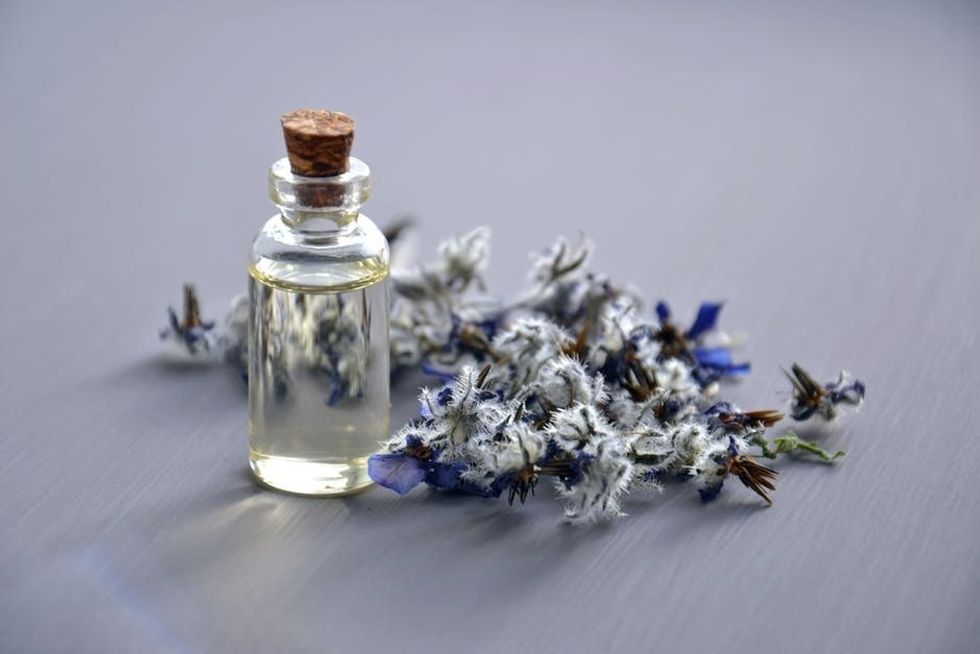Essential oils are ultimately just plant extracts—and those are used in countless cleaning and personal-care products, and are the main ingredient in some pest-control products and some over-the-counter medications, like Vick's VapoRub and some lice sprays. They're used in the food industry because of their preservative potency against food-borne pathogens—thanks to their antimicrobial, antibacterial, and antifungal properties. Various oils have also been shown to effectively treat a wide range of common health issues such as nausea and migraines, and a rapidly growing body of research is finding that they are powerful enough to kill human cancer cells of the breast, colon, mouth, skin, and more.
I was first introduced to essential oils when I bought my first oil diffuser a year ago, and instantly fell in love. I was tired of how fast I was going through candles (another one of my obsessions) and how the scent from air fresheners never really lasted, and decided to try a new alternative. Usually 6 drops is all it takes to freshen the air, but sometimes you may want more oil for a stronger scent.Essential oil diffusers are used to vaporize oils, releasing small amounts into the air. The same safety concerns regarding inhaling essential oils also apply to using oils in a diffuser.
Overall inhalation is considered a very safe method of using oils that poses a low level of risk. Be sure to use the right types and amounts of oils for your purpose, whether for skin, hair, or diffusing. Not only can they be used in an oil diffuser to It's both easy and hard to select the essential essential oils in my life: Easy, because there are so many wonderful, functional oils out there. Hard, because narrowing them down is like selecting a favorite child.
My personal favorite for relaxation, stimulation, and overall scent are lavender, peppermint, and lemon. Combining essential oils to make your own signature blend is also a possibility. All the essential oils offer a wide variety of health benefits, many smell pretty good but, most importantly, each has the power to make you feel very good, too.
Lavender essential oil is sedative, antispasmodic, anti-anxiety, anti-inflammatory, antimicrobial, antioxidant, antibacterial, anesthetic, anti-carcinogenic, immune boosting and antiviral. It's perhaps the most versatile, gentle and effective essential oil out there, thus explaining its ubiquity. (Trust: The hype is real.)
Peppermint essential oil is a stimulant, antispasmodic, antiviral, antimicrobial, anti-fungal and antioxidant. It is an effective treatment for headaches: Participants in one study reported a significant reduction in the pain of their tension headaches within fifteen minutes, and the pain continued to drop for the following hour. It can help soothe nausea, improve concentration and memory, and is an analgesic, which means it numbs and kills pain on the skin.
Lemon essential oil is a powerful antibacterial, astringent and antiseptic agent, which makes it a great ingredient in DIY home cleaners. It also contains a high concentration of D-limonene, a compound that assists in diminishing the appearance of wrinkles, promoting circulation and toning the skin. In fact, recent research showed that D-limonene exhibits powerful skin-repairing and anti-inflammatory properties. Just be careful because lemon essential oil can make the skin highly photosensitive – sunscreen, sunscreen!
The amazing thing about essential oils is that each one is like getting eight medicines in one. So start wherever you want, but I guarantee that you'll find that you'll be as obsessed with them as I am. Essential oils are excellent bath add-ons as well, whether you want to turn your bathroom into a dreamy spa-like sanctuary or get in touch with your pre-Twitter self, at least for one day.
















